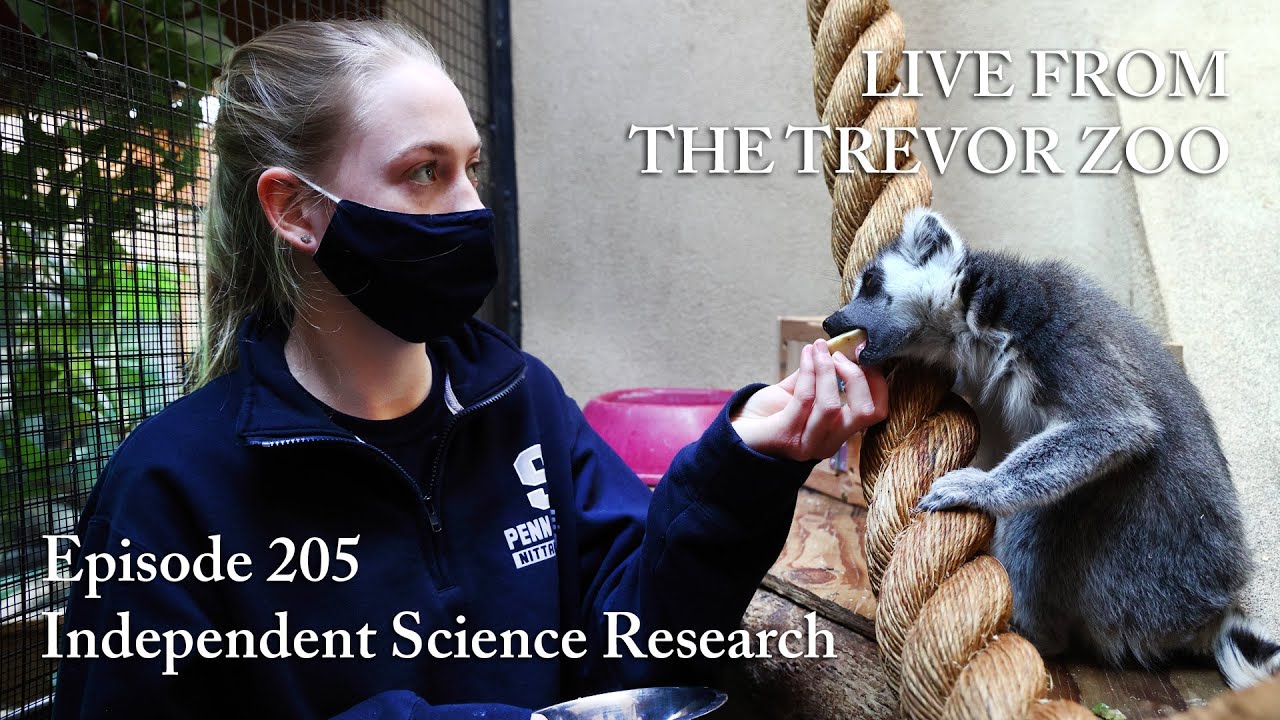*****
Summary of Transcript:
The video features Amber Hatfield, a student at Millbrook School and a head curator at the Trevor Zoo. Amber discusses her project, which studied the effects of behavioral enrichment items on the cortisol levels of lemurs at the Trevor Zoo. She discusses her experience working at the zoo since she was 12, the importance of caring for endangered species, and how being a student curator has helped her teach younger students about the zoo. She also talks about her interest in biology, animal behavior, environmental science, and the independent science research course she participated in.
*****
Summary of Description:
In episode 205 of Live From the Trevor Zoo, Student Head Curator Amber Hatfield presented her Independent Science Research Project, which focused on the effects of enrichment on the cortisol levels of lemurs. The episode was streamed live on Facebook on May 19th, 2021, and featured links for more information on the Trevor Zoo and Millbrook School and ways to support the Trevor Zoo. Additionally, viewers were encouraged to follow the zoo on social media and subscribe to their YouTube channel.
*****
The Importance of Enrichment for Lemurs
Amidst a backdrop of lush trees and chirping birds, the Trevor Zoo’s student head curator, Amber Hatfield ’21, shared her Independent Science Research Project on how enrichment affects the cortisol levels of their lemurs in a live streaming event.
Lemurs, unique primates found only on the island of Madagascar, are known for their friendly and playful nature. In captivity, however, they often lack stimulation; their behavior can become stereotypic, meaning they become fixated on certain actions, such as pacing back and forth or biting their fur excessively. Hatfield’s experiment explores how enrichment activities can positively impact the lemurs’ cortisol levels.
Enrichment Activities
The idea behind enrichment activities is to make animals’ lives interesting and improve their physical and mental well-being. Enrichment activities provide the animals with a more stimulating environment to live in done through adding things such as toys or puzzles, changing their diet, or giving different scents in their enclosure. It can also reduce boredom-associated issues like animals and stress.
Cortisol Levels
Cortisol is a hormone related to stress, so measuring its concentration in an animal’s urine can be used to detect stress levels. High cortisol levels can lead to negative health outcomes, whereas low cortisol levels can create a more stress-free environment.
The Experiment
In her experiment, Hatfield placed different enrichment activities in alternating weeks to observe any changes in cortisol levels in the lemurs over time. The activities ranged from providing various kinds of grass to play with to more complex puzzles containing hidden food rewards.
Throughout the experiment, Hatfield collected urine samples from the lemurs to measure their cortisol levels before, during, and after the different enrichment activities. She found that the cortisol levels decreased when the lemurs were given enrichment activities. This suggests that providing more stimulating environments for the lemurs can result in a decrease in stress levels.
The Impact of Enrichment Activities
Enrichment activities can treat captive animals more ethically by reducing stress levels. This experiment highlights the importance of providing enrichment activities for captive animals, such as the lemurs at the Trevor Zoo. It suggests that such activities are to make the animals’ lives more interesting and improve their physical and mental well-being. et
Additionally, this research has far-reaching applications, as it shows how enrichment activities could benefit all types of animals in captivity. It also raises an important ethical question surrounding the ethical treatment of animals in detention, which may otherwise suffer from boredom and lack of stimulation.
Supporting Zoo Conservation Efforts
The Trevor Zoo, established in 1936, is the only zoo in the United States associated with a high school – the Millbrook School in New York. It is an accredited Association of Zoos and Aquariums member, and its conservation efforts contribute to the captive breeding and reintroducing of endangered species into the wild. The 6-acre zoo is home to more than 80 different species of animals worldwide, including red pandas and pumas.
The Trevor Zoo relies on donations from individuals and organizations to support these conservation efforts. Interested parties can donate through their website, http://www.millbrook.org/zoodonations.
Conclusion
The Trevor Zoo’s Independent Science Research Project highlights the importance of enrichment activities in reducing stress levels in capZoo’sanimals. While the study focused on lemurs, it has far-reaching implications for all captive animals’ humane treatment and welfare. This research shows that providing enrichment activities is about making the animals’ animals interested and improving their physical and mental health. Donations can be made through their website to animals to conserve endangered species at the Trevor Zoo.
*****
Source Description
LIVE From the Trevor Zoo – Episode 205, Independent Science Research
Student Head Curator Amber Hatfield ’21 shares her Independent Science Research Project – a study of how enrichment affects the cortisol levels of our lemurs.
Epi’21e streamed live on Facebook on May 19th, 2021
Links mentioned in the show:
https://www.youtube.com/millbrookschoolny
For more information on the Trevor Zoo and Millbrook School, check out our live cameras at http://www.millbrook.org/trevorzoolive.
To support the Trevor Zoo, please go to http://www.millbrook.org/zoodonations.
•••••••••••••••••••••••••••••••••••••••••••••••••••
Keep up with the Trevor Zoo!
INSTAGRAM: http://instagram.com/trevorzoomillbrook
TWEET US: http://twitter.com/trevorzoo @TREVORZOO
FACEBOOK: http://facebook.com/trevorzoomillbrook
OUR WEBSITE: http://www.trevorzoo.org
OUR LIVESTREAMS: http://www.millbrook.org/trevorzoolive
•••••••••••••••••••••••••••••••••••••••••••••••••••
PLEASE SUBSCRIBE www.youtube.com/trevorzoomillbrook


